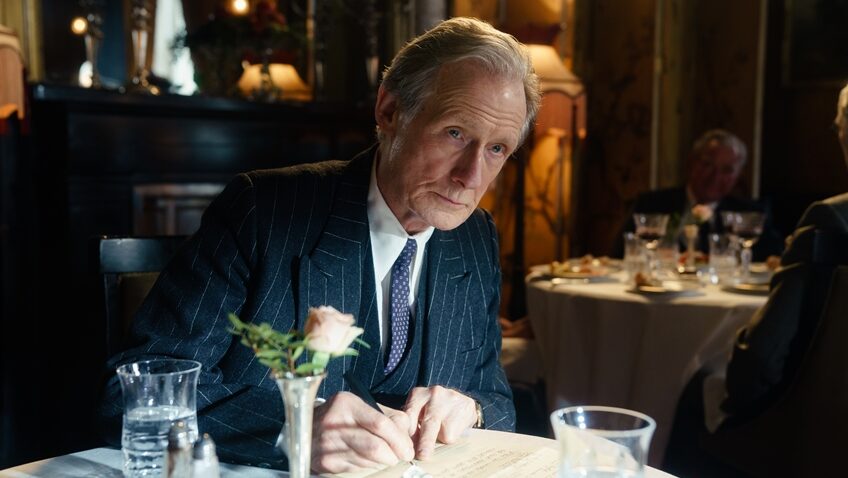Joyce Glasser reviews Living (November 4, 2022) Cert 12A, 102 mins.
Director Oliver Hermanus’ first film shot outside of his native South Africa; Living has several USPs. The screenplay is by Sir Kazuo Ishiguro (Never Let Me Go, Remains of the Day) who was awarded the Nobel Prize for Literature in 2017, and it is based on the great Japanese director Akira Kurosawa’s little known, and uncharacteristic 1952 film Ikiru (To Live). In a thread reminiscent of a Russian doll, Ikiru was, in turn, inspired by Tolstoy’s novella, The Death of Ivan Ilyich. And it stars Bill Nighy, 72, an understated actor in his most understated film to date. If the original film does not travel particularly well, the moving story about validating an unfulfilled life in the face of death is universal.
Mr Williams, a widower, is so unassertive that you could forget he existed. Although they live with him, his caring, though undemonstrative son (Barney Fishwick) and controlling, conventional fiancée (Patsy Ferran) already have.
If Mr Williams ever had dreams, ambitions and aspirations they dead-ended in his job as Manager of Public Works (probably the now defunct Department of Public Buildings and Works) in County Hall where inertia is the status quo. Now he manages a team of self-effacing, respectful paper pushers, and as if deep down, he is ashamed of the artificial person he has become he presents a cold and formal façade to the world.
Williams is introduced to us through the darting eyes and ears of a new, young employee at the Public Works Department at County Hall, Mr Wakeling (Alex Sharp), who is not yet hardened and deadened by the job he is eagerly undertaking. Wakeling’s colleagues on the early morning train into London barely speak and exchange awkward looks when Wakeling asks questions or tries to make conversation. The frosty Mr. Williams never travels on the same train as his underlings and communication at work is restricted to Williams directing his staff to his ever-increasing in-tray.

The only lady on the team, Margaret Harris (Aimee Lou Wood, TV’s Sex Education and The Electrical Life of Louis Wain), to whom Wakeling is instantly attracted, tells him with a sparkle in her eye, that their first task is to keep the paper skyscraper high. If she intended any irony in her remark, it is not explicit, but Wakeling recognises in her eyes another living being and responds with hope.
This hope is dashed, if not killed, early on when Wakeling is thrown in at the deep end, after a small group of mothers appear to enquire about what is now a long neglected file in the skyscraper. Their proposal for a modest children’s playground on their council estate has been subjected to a Kafkaesque bureaucratic routine that the frustrated, campaigning mothers know better than the naïve new employee assigned to their file.
Then one day Williams takes an unusually long lunch to visit his doctor. He learns that he has approximately six months to live, ten at most. Williams is shaken as the finality sinks in. It is as if he cannot imagine how age and death crept up on him without him noticing, while he was busy pushing paper. He begins to search for ways to give his life meaning before it is too late.
Stuffing bank notes in his pockets, he goes to the seaside, where he meets a drifter, Mr Sutherland (Tom Burke from BBC’s Strike, The Souvenir, Manx) at a bar and tells him the news that no one else knows. He has just enough time to put his life in order and live a little. Williams confesses that he withdrew a lot of money, ‘thinking I would live a little, but I realise I don’t know how.’ We fear for the worst, but if Sutherland cannot really help, he is a compassionate alcoholic and takes the older man to all the hot spots. But such entertainment is not the “how” for Williams.
Still not returning to the office, but wandering around the area, Williams bumps into Ms Margaret Harris who needs a letter of recommendation to leave her job at County Hall before it defeats her, too. It is awkward for her to ask for the letter, thereby admitting she wants to leave her job, but Williams does not take it personally. In fact, and to Margaret’s surprise, he invites her to lunch at Fortum & Mason. He tells her about his prognosis, and later, when she meets his son, she is shocked to learn that he never knew that his father was ill.

This meeting begins a relationship that is more paternal than romantic, although we wonder, and Mr Williams must, too, whether marrying an independent, energetic, ambitious, but kind woman like Margaret might have changed his life. And he feeds off of her ambition and vitality which are like a tonic to him. In her modest, empathetic way, Harris shows him how to live. Perhaps, too, Williams recognises in Mr Wakeling the young man he once was, and it is Wakeling who pursues a romantic relationship with Margaret Harris.
After a long leave of absence from work, Williams returns to set in motion one small project, which will not change the world, but will touch a few lives, create moments of happiness in the dreary post-war days when food was still being rationed.
The challenge to Nighy is handling the transition for his character’s transformation from the equivalent of a Tolstoian “artificial” life to an “authentic” life of compassion and empathy. It is not marked with grandiose gestures or an extreme change of character. He connects with the boy in him who once sat in the playground hoping that he would not be the last boy left on the bench when teams are being picked. Williams, ever courteous, follows the rules, but now he is liberated by a steely resolve to leave a legacy.
A lovely tonal shift marks the otherworldly ending, which is a tearjerker.
Whilst it is easy to imagine this story in a defeated post-war Japan that is already known for its particularly formal office culture, one might question the historic setting in the UK, a year after the Festival of Britain. The London County Council Architects’ Department was the world’s largest and most prestigious architectural practice in the world launching the careers of talented, enthusiastic planners and architects. Set in 2022, the film might have a satirical edge.




